THE BIRTH OF CAIN AND ABEL
In Genesis 3 we have the root of sin and in Genesis 4 the fruit of sin.
How bad is sin?
Well, in this chapter, we find that man was not just suffering from ptomaine poisoning because of having eaten the fruit of the tree of knowledge of good and evil.
Chapter 4 reveals how much had really happened to the man.
By his disbelief and his disobedience, he had turned away from God and had sinned in such a way that he brought upon himself and his race His judgment, because you and I are given this same kind of nature.
We have the same nature that our father had, and Adam has given all of us a pretty bad nature. All this is revealed in the story of the two sons of Adam and Eve.
They had more children than this, but we are given the record of only these two at this time.
The first three chapters of Genesis explain the creation and loss of paradise, as Adam and Eve are separated from God both physically and spiritually. Their relationship with Him does not end, however.
Eve recognizes His help in bearing her son Cain and later Seth. Cain and Abel both worship God until Cain kills Abel. God provides protection for Cain, whose descendants become innovative, artful, arrogant, and violent.
The descendants of Seth, however, begin to call on the Lord’s name. This chapter bridges the story of Genesis from our ultimate origins to the story of Noah, introduced in the next chapter.
Genesis 4:1-5 KJV
[1] And Adam knew Eve his wife; and she conceived, and bare Cain, and said, I have gotten a man from the LORD.
[2] And she again bare his brother Abel. And Abel was a keeper of sheep, but Cain was a tiller of the ground.
[3] And in process of time it came to pass, that Cain brought of the fruit of the ground an offering unto the LORD.
[4] And Abel, he also brought of the firstlings of his flock and of the fat thereof. And the LORD had respect unto Abel and to his offering:
[5] But unto Cain and to his offering he had not respect. And Cain was very wroth, and his countenance fell.
Genesis 4:1
And Adam knew Eve his wife; and she conceived, and bare Cain, and said, I have gotten a man from the LORD.
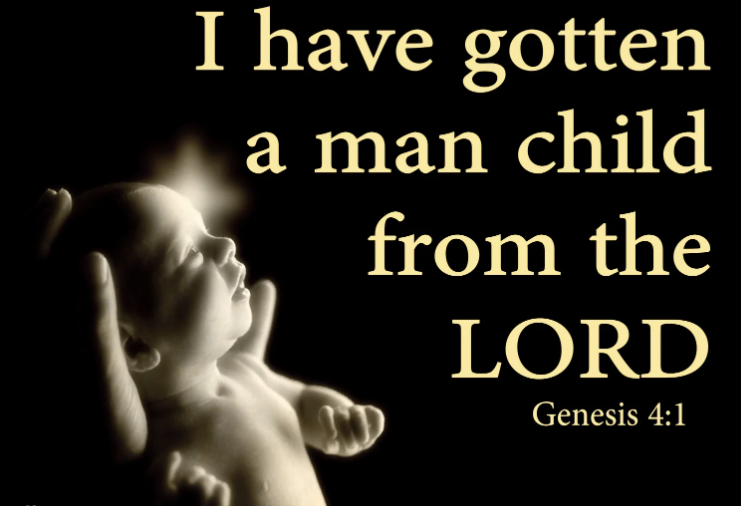 Our lesson text now jumps past the account of the fall in Genesis 3 to the conception and birth of Cain. The majority of interpreters see all the events of Genesis 4 as occurring after Adam and Eve’s expulsion from the Garden of Eden (3:23, 24).
Our lesson text now jumps past the account of the fall in Genesis 3 to the conception and birth of Cain. The majority of interpreters see all the events of Genesis 4 as occurring after Adam and Eve’s expulsion from the Garden of Eden (3:23, 24).
Against this understanding, however, is a proposal that the construction in the original language has the author backtracking (at least briefly) to events that occur prior to the expulsion. This theory means that Eve’s future punishment noted in Genesis 3:16 connects with childbearing already experienced.
Whether what is recorded in the verse before us happens before or after the fall may affect interpretation. If the birth of Cain takes place before the fall, then Eve’s words I have gotten a man from the Lord are seen as giving the Lord credit.
If the birth of Cain takes place after the fall into sin, however, Eve’s words are understood by some to be a boast in that she is claiming to have created a man just as the Lord did. This reveals the fact that Adam and Eve certainly did not anticipate that the struggle was going to be long.
When Cain was born, Eve must have said, “I have gotten the man from the Lord. God said that the seed of the woman would bruise the head of the serpent—and here he is!”
But Cain was not the one. He was a murderer, he was no savior at all. It will be a long time before the Savior comes.
For a minimum of six thousand years—and I think it has been longer than that—the struggle has been going on between the seed of the woman and the seed of the serpent.
In either case, we see underway the God-ordained imperative to multiply. The sexual function between husband and wife is God-ordained. Sexual expression neither resulted in nor resulted from the fall into sin by Adam and Eve.
The name Cain occurs 20 times in 17 verses in the KJV, and all but one of these (Joshua 15:57) refers to the individual in the verse before us. Three of the occurrences are in the New Testament (Hebrews 11:4; 1 John 3:12; Jude 11).
Now begins the story of human history apart from the perfection of the Garden of Eden, as the first generation born into sin comes to earth. Adam and Eve slept together, conceived, and named their firstborn son Cain.
Eve’s statement of gratitude reflects her continued faith in God’s goodness and provision. Even outside of the garden, Eve understood she owed her life and every good gift to the Lord.
In a way, this is remarkable. Eve doubtlessly experienced great pain in bearing and giving birth to Cain, something she would have expected after hearing God’s curse for her (Genesis 3:16). Instead of resenting God for that, she gives Him credit for helping her through the process of receiving this gift of a son.
The name Cain in Hebrew is Qā’yin, which is closely related to the word qanah, meaning “obtained” or “gotten.” His birth is a happy occasion, and a fulfillment of God’s intent to keep the human race alive. Unfortunately, this joy will be marred by Cain’s actions later in life, as detailed in the next verses.
Genesis 4:2.
And she again bare his brother Abel. And Abel was a keeper of sheep, but Cain was a tiller of the ground.
These are the two boys that we are looking at. The designation Abel occurs 16 times in 13 verses in the KJV, although some refer to a stone (1 Samuel 6:18) or a city (2 Samuel 20:14, 15, 18).
Four of the references to Abel the man are in the New Testament (Matthew 23:35; Luke 11:51; Hebrews 11:4; 12:24). To be either a keeper of sheep or a tiller of the ground is a common occupation in antiquity.
After Cain’s birth, Adam and Eve conceive again. Abel, Cain’s brother, is born. The story jumps forward in time in this verse, leaving quite a few details unanswered. This is normal for the book of Genesis, which often describes major portions of history in just a few summary verses.
Among the unanswered questions of this particular verse is whether or not Adam and Eve had additional children in the meantime. Ancient genealogies often only mention the “important” offspring, so to speak. So, it’s likely, but not certain, that Cain and Abel had other siblings prior to their conflict.
A major point in favor of this view is Cain’s fear of other people in Genesis 4:14, and the mention of his wife in Genesis 4:17. These imply that there were other people alive at the time of his conflict with Abel, meaning other children of Adam and Eve.
That being said, nothing in the text, or the story, requires that there were other siblings, nor does it demand that there were not. This is simply an open point on which Scripture does not provide clear details.
This verse reveals the brothers’ professions. Abel keeps sheep. Cain farms, working the ground for crops. Both were respectable and necessary professions among the second generation of pioneering humans.
Genesis 4:3
And in process of time it came to pass, that Cain brought of the fruit of the ground an offering unto the LORD.
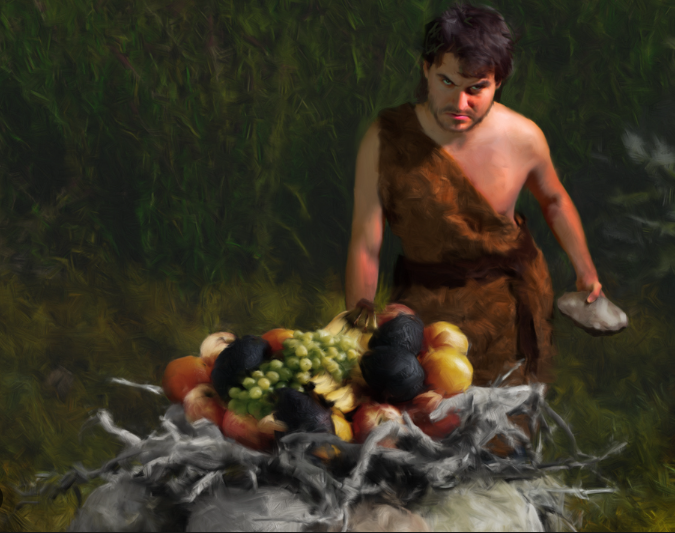 The phrase used here refers to a long indefinite period.
The phrase used here refers to a long indefinite period.
This was probably the first offering that he brought, even though the Lord had explained to the First Family the necessity of the Sacrificial System, that is, if they were to have any type of communion with God and forgiveness of sins.
There is evidence that Adam, at least for a while, offered up sacrifices. “In process of time” actually means “at the end of days,” which would mean on the Sabbath Day, on the day that God had rested. “Cain brought”—the idea of “brought” means to an appointed place.
They are bringing an offering to God to an appointed place to worship. All this would indicate that they are doing it by revelation.
I know that they are, for when we turn to Hebrews 11:4, we read: “By faith Abel offered unto God a more excellent sacrifice than Cain, by which he obtained witness that he was righteous, God testifying of his gifts: and by it he being dead yet speaketh.”
How could Abel offer it “by faith”?
“So then faith cometh by hearing, and hearing by the word of God” (Rom. 10:17). God had to have given His Word about this, or this boy Abel could never have come by faith, and that is the way he came. The other boy did not come that way. “Cain brought of the fruit of the ground.” There is nothing wrong with the fruit.
Don’t think that he brought the leftovers—his attitude is not that of giving old clothes to the mission. I think that the fruit he brought would have won the blue ribbon in any county or state fair in the country. He brought the best of his beautiful, delicious fruit. and he brought it as an offering to the Lord.
Cain knew the type of Sacrifice that the Lord would accept, but he rebelled against that admonition, demanding that God accept the labor of his hands, which, in fact, God could not accept. So we have, in the persons of Cain and Abel, the first examples of a religious man of the world and a genuine man of Faith.
This verse begins a sentence concluded in verse 4. The first thing we notice is that Cain has a relationship, of some kind, with God. He brings God an offering, the product of his work as a farmer of the fruit of the ground.
Even living under the curse and apart from the garden, this second generation of humans continue to see themselves in relationship to God and responsible to Him. God did not completely abandon mankind, and mankind did not turn their backs on God. While the fall ruined our relationship with God, it did not erase it.
Again, there are very few details in this part of the Bible. We have no specific knowledge of what Cain’s offering was. We have no way to know if God has asked for something in particular, or what kind of attitude Cain had when he brought his gift.
What we do know, based on verse 5, is that God is not pleased with what Cain brings. First John 3:12 suggests that Cain was evil, and this had something to do with this incident.
Perhaps Cain was only going through the motions, while Abel was sincerely and humbly honoring God. The fact that Cain responds to God’s loving correction in verse 7, makes this a very likely interpretation.
Rather than changing his actions to make things right, Cain will respond to God’s rejection of his offering with anger and violence.
Genesis 4:4
And Abel, he also brought of the firstlings of his flock and of the fat thereof. And the LORD had respect unto Abel and to his offering:
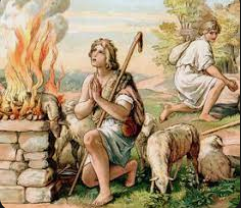 This is what God demanded; it was a blood sacrifice of an innocent victim, a lamb, which proclaimed the fact that Abel recognized his need of a Redeemer, and that One was coming Who would redeem lost humanity; the Offering of Abel was a Type of Christ and the price that He would pay on the Cross of Calvary in order for man to be redeemed.
This is what God demanded; it was a blood sacrifice of an innocent victim, a lamb, which proclaimed the fact that Abel recognized his need of a Redeemer, and that One was coming Who would redeem lost humanity; the Offering of Abel was a Type of Christ and the price that He would pay on the Cross of Calvary in order for man to be redeemed.
As stated, this was a Type of Christ and the Cross, the only Offering which God will respect. Abel’s Altar is beautiful to God’s Eye and repulsive to man’s.
Cain’s altar is beautiful to man’s eye and repulsive to God’s. These “altars” exist today; around the one that is Christ and His atoning work, few are gathered, around the other, many. God accepts the slain lamb and rejects the offered fruit; and the offering being rejected, so of necessity is the offeror.
Cain and Abel both have a relationship with the God who made their parents with His own hands. Both are bringing offerings to him. The previous verse tells us that Cain, the farmer, brought crops to the Lord: the fruit of the ground. Abel, the keeper of sheep, brought fat portions from a firstborn lamb from his flock.
Details are scarce in this part of Scripture. Only the most basic information is being given. So, we don’t know if God required some particular form of sacrifice, sacrifice at certain times, or of some quantity.
As far as we know from this text, God may or may not have expressed His will about the kinds of offerings He would accept.
Later, under the Law of Moses, God will require Israel to bring very similar offerings as part of their worship of Him and to receive atonement for their sin. Those details are not mentioned in this passage, and we have no way of knowing if God gave such a requirement to Cain and Abel.
That being said, it seems Abel’s offering (Genesis 4:4; Exodus 13:12 more closely matches the requirements of this future law than Cain’s (Genesis 4:3; Leviticus 2:12; Numbers 18:12). This may help to explain why the Lord approved of Abel’s offering and looked on Abel with favor, above his older brother.
Genesis 4:5
But unto Cain and to his offering he had not respect. And Cain was very wroth, and his countenance fell.
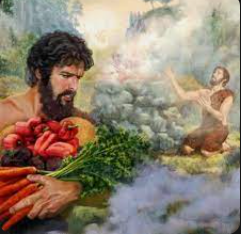 Someone may say, “I don’t see anything wrong in the thing Cain did.” In the eleventh verse of his epistle, speaking of apostates in the last days, Jude says, “. . . They have gone in the way of Cain . . .”
Someone may say, “I don’t see anything wrong in the thing Cain did.” In the eleventh verse of his epistle, speaking of apostates in the last days, Jude says, “. . . They have gone in the way of Cain . . .”
What is the way of Cain?
When Cain brought an offering to God, he did not come by faith—he came on his own. And the offering that he brought denied that human nature is evil.
God said, “Bring that little blood sacrifice which will point to the Redeemer who is coming into the world. Come on that basis, and don’t come by bringing the works of your own hands.”
Cain’s offering also denied that man was separated from God. He acted like everything was all right. This is what liberalism does today in talking about the universal fatherhood of God and the universal brotherhood of man.
My Christian Siblings, things are not all right with us today. We are not born children of God. We have to be born again to become children of God. Man is separated from God. Cain refused to recognize that, and multitudes today refuse to do so as well.
The third thing that Cain’s offering denied was that man cannot offer works to God—Cain felt he could. Scripture says: “Not by works of righteousness which we have done, but according to his mercy he saved us, by the washing of regeneration, and renewing of the Holy Ghost” (Titus 3:5).
The difference between Cain and Abel was not a character difference at all, but the difference was in the offerings which they brought. These two boys had the same background. They had the same heredity. They had the same environment. There was not that difference between them.
Don’t tell me that Cain got his bad disposition from an alcoholic grandfather on his father’s side—he didn’t have a grandfather. And don’t say that Abel got his good disposition from a very fine grandmother on his mother’s side. They just didn’t have grandparents. They had the same heredity and the same environment.
The difference was in the offerings. That offering makes a difference in men today. No Christian takes the position that he is better than anyone else. The thing that makes him a Christian is that he recognizes that he is a sinner like everyone else and that he needs an offering, he needs a sacrifice, and he needs Someone to take his place and to die for him.
Paul says of Christ: “Whom God hath set forth to be a propitiation through faith in his blood . . .” (Rom. 3:25). Therefore Paul could further write: “For they being ignorant of God’s righteousness, and going about to establish their own righteousness, have not submitted themselves unto the righteousness of God” (Rom. 10:3).
That is the picture of multitudes of people today. They are attempting through religion, through joining a church and doing something, to make themselves acceptable to God. God’s righteousness can only come to you—because it must be a perfect righteousness—through Christ’s providing it for you.
“Who was delivered for our offences, and was raised again for our justification” (Rom. 4:25). 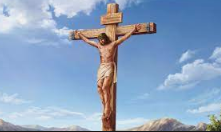 That is, He was raised for our righteousness. He was the One who took our place.
That is, He was raised for our righteousness. He was the One who took our place.
“For he hath made him to be sin for us, who knew no sin; that we might be made the righteousness of God in him” (2 Cor. 5:21). Paul says in Philippians 3:8–9, “. . . That I may win Christ, And be found in him, not having mine own righteousness, which is of the law, but that which is through the faith of Christ. . . .”
The righteousness of Cain was his own righteousness. The righteousness of Abel was faith in a sacrifice that looked forward to Christ’s sacrifice. We have seen that Cain and Abel had come together to worship God. These two boys were identical.
They were the sons of Adam and Eve. However, there is a great divergence between Cain and Abel which is not necessarily a character divergence. One was accepted because of the sacrifice which he brought by faith; the other, Cain, brought his offering without any recognition from God at all.
Let us say it again, God has no respect for any proposed way of Salvation, other than “Jesus Christ and Him Crucified” [I Cor. 1:23; 2:2]).
That which filled Abel with peace filled Cain with wrath; the carnal mind displays its enmity against all this Truth which so gladdens and satisfies the heart of the Believer.
The previous verses revealed that the brothers Cain and Abel both had a relationship with God. Both brought Him offerings from their respective areas of work. Cain brought crops from the ground which he worked as a farmer.
Abel, a keeper of sheep, brought fat portions from a slaughtered firstborn lamb. Though this part of Scripture gives no specific reasons why, God looks with favor on Abel and his offering.
Also without much detail, this verse tells us God had no regard for Cain and his offering. Unless the brothers had been told to bring animal sacrifices, God’s response may seem unfair to us at first. Later in this book, God will be clear in requiring animal sacrifices from His people.
Had He been clear with Cain about what He preferred? Was Cain offering something less than his “first fruits,” in comparison to Abel? We don’t know.
It seems more likely that God rejected Cain’s offering because of Cain’s heart and not merely because of the physical offering Cain brought. This is supported by New Testament comments such as 1 John 3:12.
Cain’s angry response definitely reveals a darkened heart. Instead of being teachable, eager to adjust his offering or himself in order to be pleasing to God, Cain gets mad. His “face falls.”
In the following verses, God will gently, lovingly warn Cain about the consequences of choosing anger over a willingness to change his path to please God. Cain’s choice to ultimately choose anger and violence over submission speaks volumes of the state of his heart (Genesis 4:8).
I hope that you have really enjoyed this post,

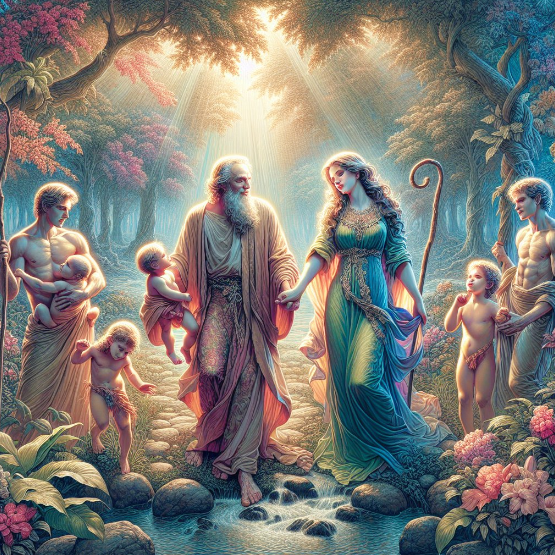











This origin story of man is a tough way to start a movement.
So God creates a perfect, blissful world for people to enjoy, but puts a limit on the things that can be enjoyed. Then when the “forbidden” items get too tempting to resist (didn’t God make things tempting?) God really wants to punish disobedience, like, forever.
Seems like a higher power should not be so spiteful.
Hello Aly,
I find it very hard to believe that GOD will create us in His Image only to tear us down. That, I disagree with, He always allows us to make our own choices.
Instructions were commanded and warning of consequences if the commands were broken, they were laid out in the beginning, so there were no hidden agendas.
Some people follow rules, some people break rules. Is there a perfect world with no order?
These are words found in the “spiteful definition”
malicious, mean, nasty, cruel, unkind, unfriendly, snide, hurtful, wounding, barbed, cutting, hateful, ill-natured, bitter, venomous, poisonous, acid, hostile, rancorous, malevolent, evil-intentioned, baleful, vindictive, vengeful, vitriolic, vicious, splenetic, malign, malignant, bilious, defamatory, catty, malefic, maleficent.
These words do not describe the GOD I know.
Thank you for sharing your opinion on this subject, we should converse more about these type of things.
May Your Days Be Blessed,
Jerry
You made me remember the scripture that says I am the way, the truth and the life.
There is no other way to the Father, except through Jesus. And like you rightly said Abel’s offering was that of faith. In the same way it will take faith to believe in Jesus and accept that He is the only son of God.
And anyone that will come to Him must come via faith that He is the truly begotten son of the father
Hello Parameter,
Thank you for commenting on yet, another HBS & DwJ episode. Your continued support is greatly appreciated.
I am trying to do my part to make the world a much better place by introducing the Word of GOD to those who do not know, and it especially pleases me to be a part in reminding someone of scripture.
Thanks again,
Continued Blessings My Friend!
I had never heard anyone else talk about whether Cain and Abel were born before or after the Fall.
In my times at Church, I think it was just assumed it happened afterward.
It seemed rather mean that God accepted Abel’s offering but rejected Cain’s. Both of the men made their offerings using their own hands.
The Bible, God’s word, didn’t seem to make a distinction about what made Abel’s offering acceptable and Cain’s not.
Just one more way the Bible is confusing.
Why can’t it just spell that out?
It just leaves us guessing instead of helping us understand.
Hello Jason,
Thank you for stopping by the HBS & DwJ website.
Yes, the birth of Cain and Abel happened after the Fall of Mankind according to the order of scripture in the book of Genesis.
God must have instructed them concerning the details of acceptable worship, although those instructions are not included in the Genesis narrative.
Abel was a shepherd, and his offering to the Lord was “the best portions of the firstborn lambs from his flock” (Genesis 4:4, NLT). Cain was a farmer, and his offering was “some of his crops” (Genesis 4:4, NLT). The most evident difference between the two sacrifices is that Abel’s offering was an animal (blood) sacrifice, and Cain’s was a vegetable (bloodless) sacrifice.
However, reading, studying and meditating on The Holy Bible Scriptures with an open heart answers these questions.
Hope this helps,
Blessings My Friend!
As a reader of the Genesis Holy Bible story, I found the birth of Cain and Abel to be a significant event that sets the stage for future conflicts between siblings within families.
The story highlights the consequences of jealousy and resentment in relationships, which is relatable to many people in their personal experiences. However, I can’t help but wonder why God accepted Abel’s offering over Cain’s and what message it is trying to convey about faith and worship.
It raises some thought-provoking questions about God’s nature and the importance of sincere devotion in our lives.
Hello Akumendoh,
Thanks for checking out the Adam Loving Eve episode.
GOD must have instructed them concerning the details of acceptable worship, although those instructions are not included in the Genesis narrative.
Abel was a shepherd, and his offering to the Lord was “the best portions of the firstborn lambs from his flock” (Genesis 4:4, NLT).
Cain was a farmer, and his offering was “some of his crops” (Genesis 4:4, NLT).
The most evident difference between the two sacrifices is that Abel’s offering was an animal (blood) sacrifice, and Cain’s was a vegetable (bloodless) sacrifice.
John 4:24 KJV tells us:
[24] God is a Spirit: and they that worship him must worship him in spirit and in truth.
John 1:1-4 KJV tells us:
[1] In the beginning was the Word, and the Word was with God, and the Word was God.
[2] The same was in the beginning with God.
[3] All things were made by him; and without him was not any thing made that was made.
[4] In him was life; and the life was the light of men.
I could go on and on, talking about the many scriptures describing God’s nature and the importance of sincere devotion in our lives.
However, reading, studying and meditating on The Holy Bible Scriptures with an open heart answers these questions for us.
Thanks so much for commenting, as well as your questions, they are greatly appreciated.
Blessings My Friend!
The article delves into the story of Cain and Abel, offering a deep analysis of the themes and lessons present in this biblical account.
It highlights the contrast between Cain’s disobedience and Abel’s obedience, examining the consequences of their actions and the underlying moral and spiritual principles at play.
What impressed me most about the article was its emphasis on the relevance of this ancient biblical narrative to our lives today. It draws parallels between the struggles and choices faced by Cain and Abel and the challenges we encounter in our own lives. The article encourages reflection and introspection, urging readers to examine their own hearts and actions in light of the lessons derived from Genesis 4.
Furthermore, the article provides practical applications and actionable insights for living a life that aligns with God’s Will. It explores concepts such as the importance of sincere worship, the power of repentance, and the significance of genuine love and forgiveness.
I appreciated the author’s ability to present the biblical text in a relatable and accessible manner, making it easier for readers to engage with the spiritual lessons contained within. The article encourages a deeper understanding of the Scriptures and fosters a desire to apply biblical principles in our daily lives.
Overall, the “Genesis 4 Holy Bible Study” serves as a valuable resource for individuals seeking to deepen their understanding of the Bible and draw practical lessons from its teachings.
The article’s insightful analysis, relatability, and focus on personal application make it a powerful tool for spiritual growth and reflection.
Hello Steve Steve,
Thank you so much for reading and commenting on this portion of study.
I am truly grateful that you see this information as a powerful tool for spiritual growth and reflection in our daily living as Christians.
I really appreciate your valuable time.
Blessings My Friend!